This comprehensive AP Psychology Cheat Sheet provides essential theories, key concepts, and critical information across all units of the AP Psychology curriculum. By summarizing complex topics into easy-to-understand points, it helps students efficiently review and reinforce their knowledge. The inclusion of specific theories, definitions, and example scenarios aids in the application of psychological principles, ensuring students are well-prepared for both multiple-choice and free-response questions on the exam. With clear, concise explanations and organized sections, this cheat sheet is an invaluable study aid for achieving a high score on the AP Psychology exam.
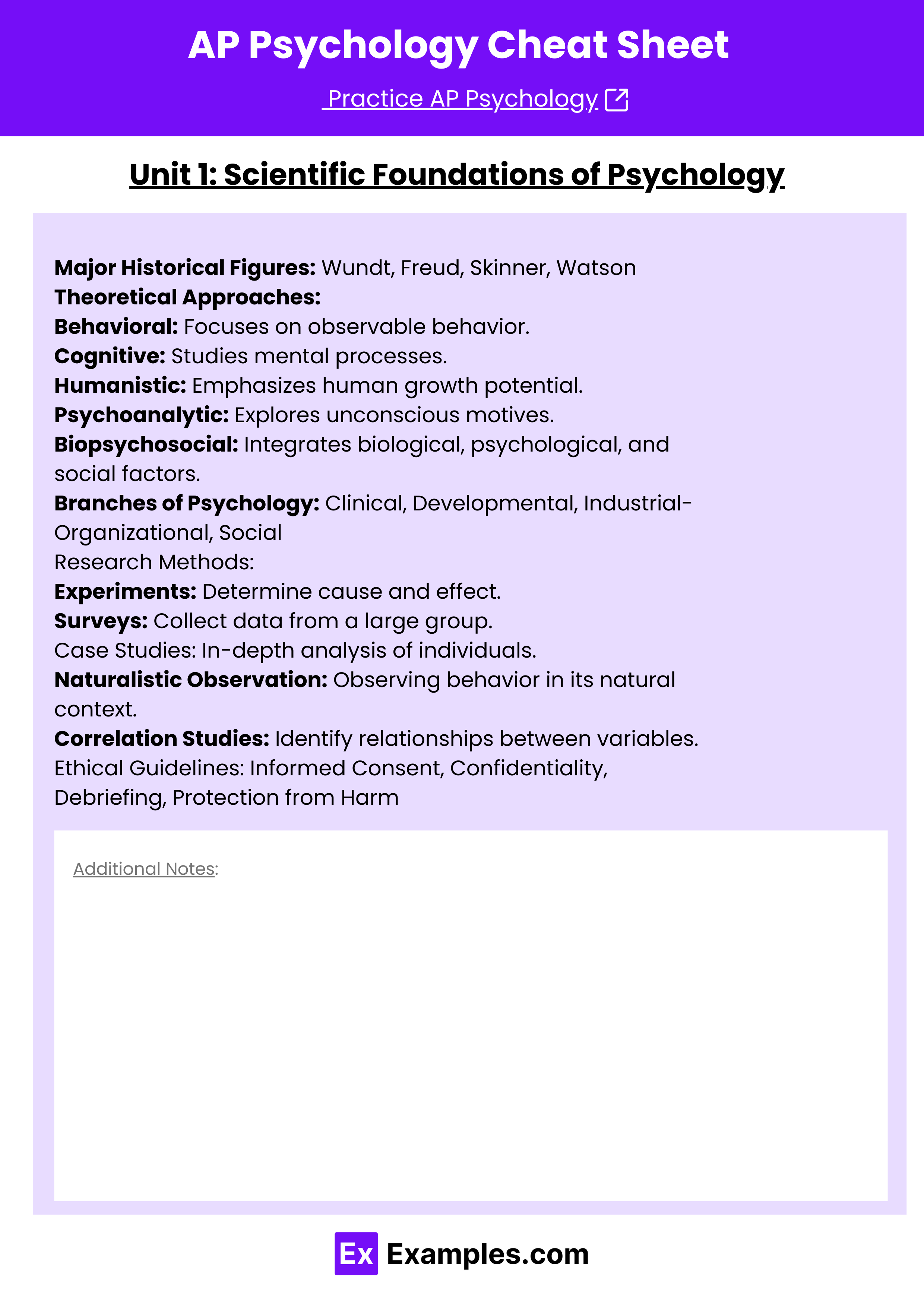
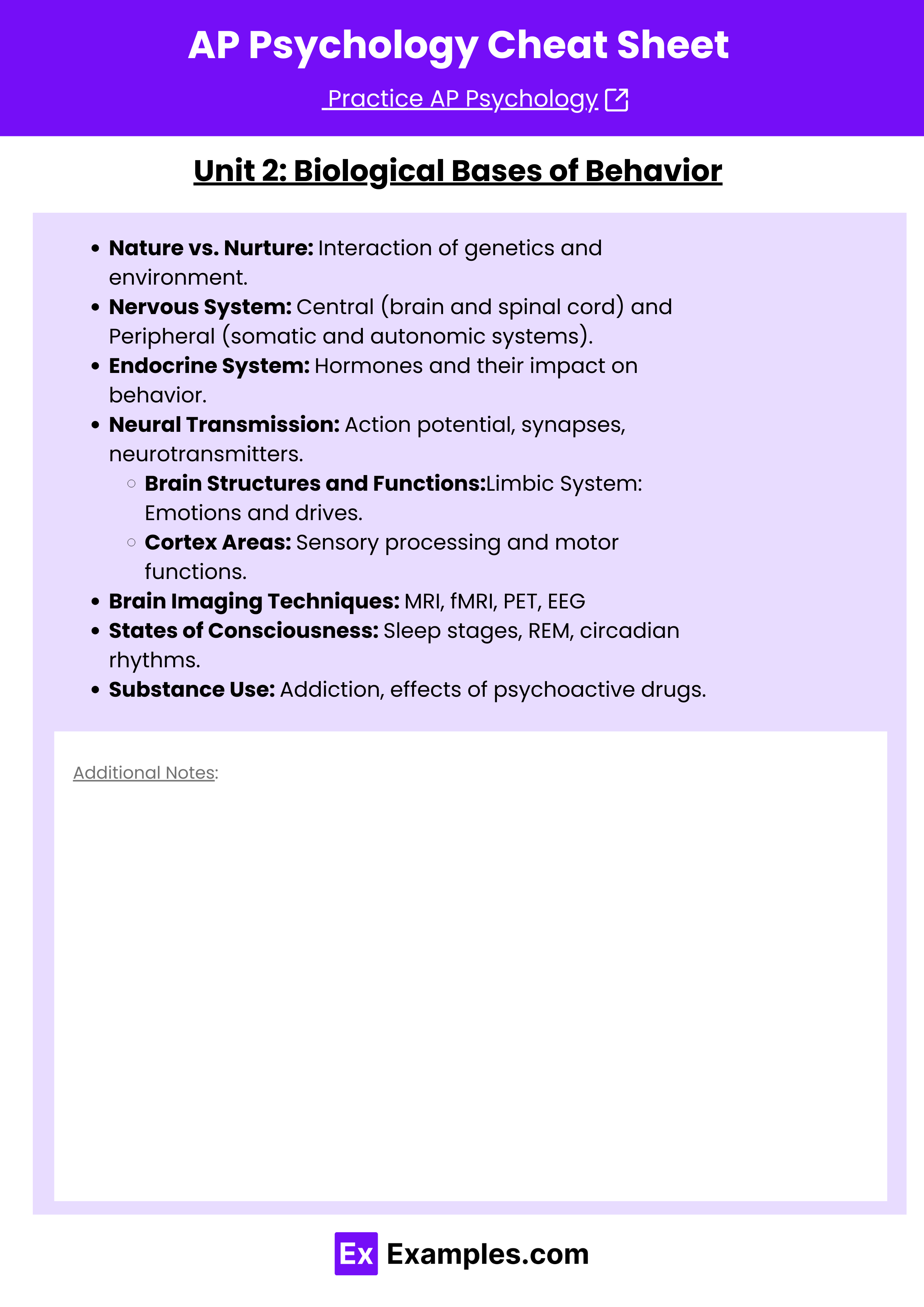
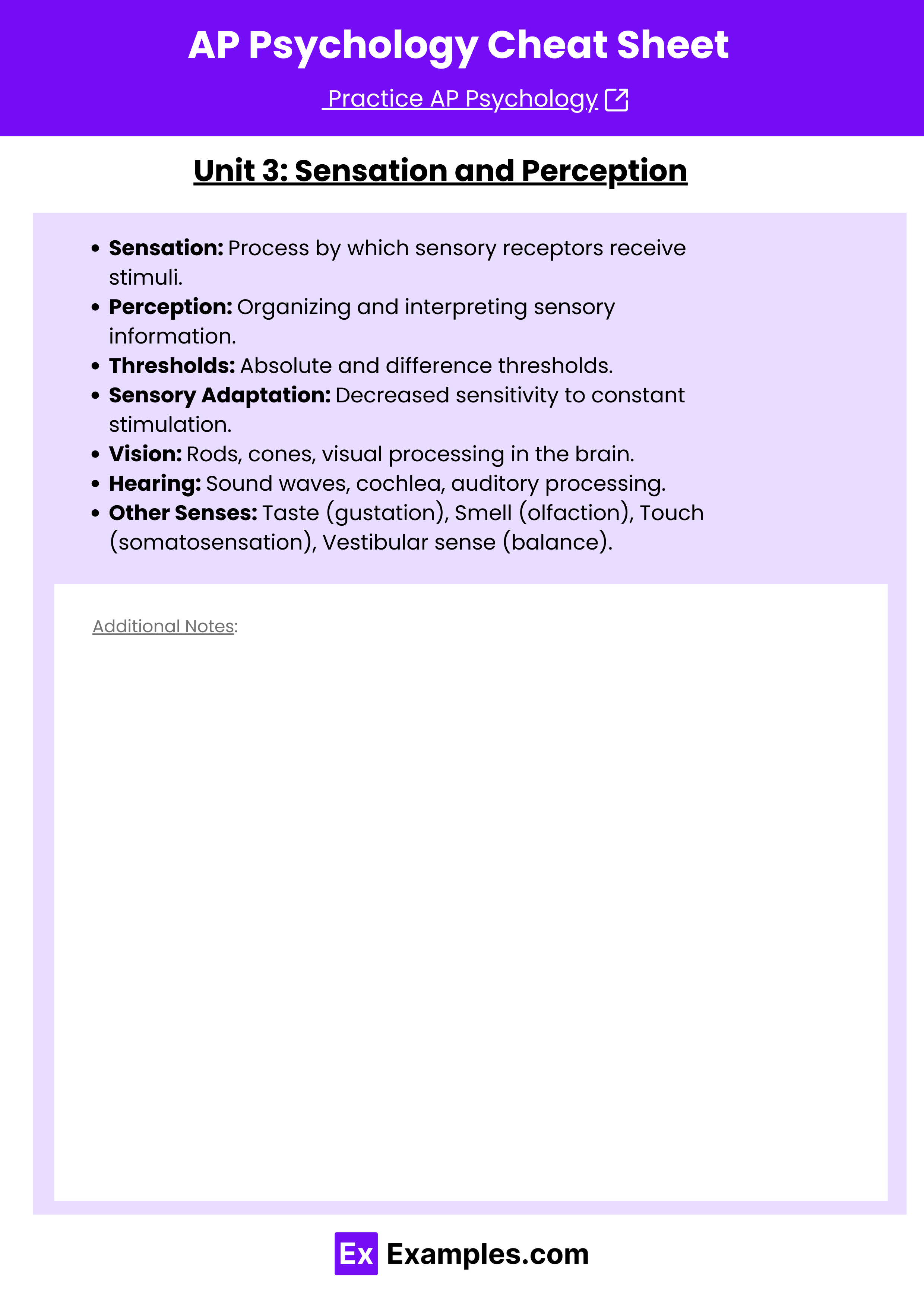
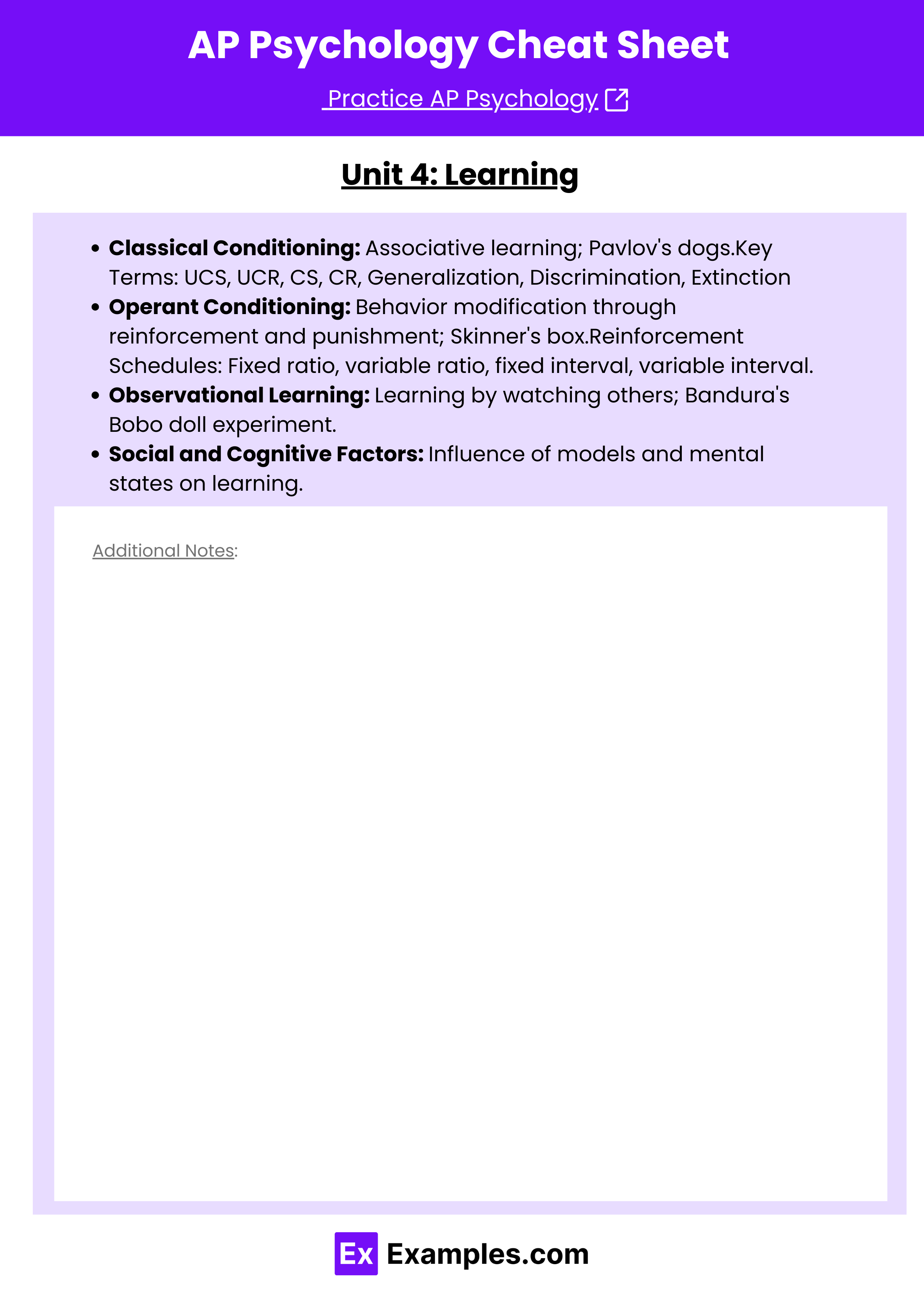
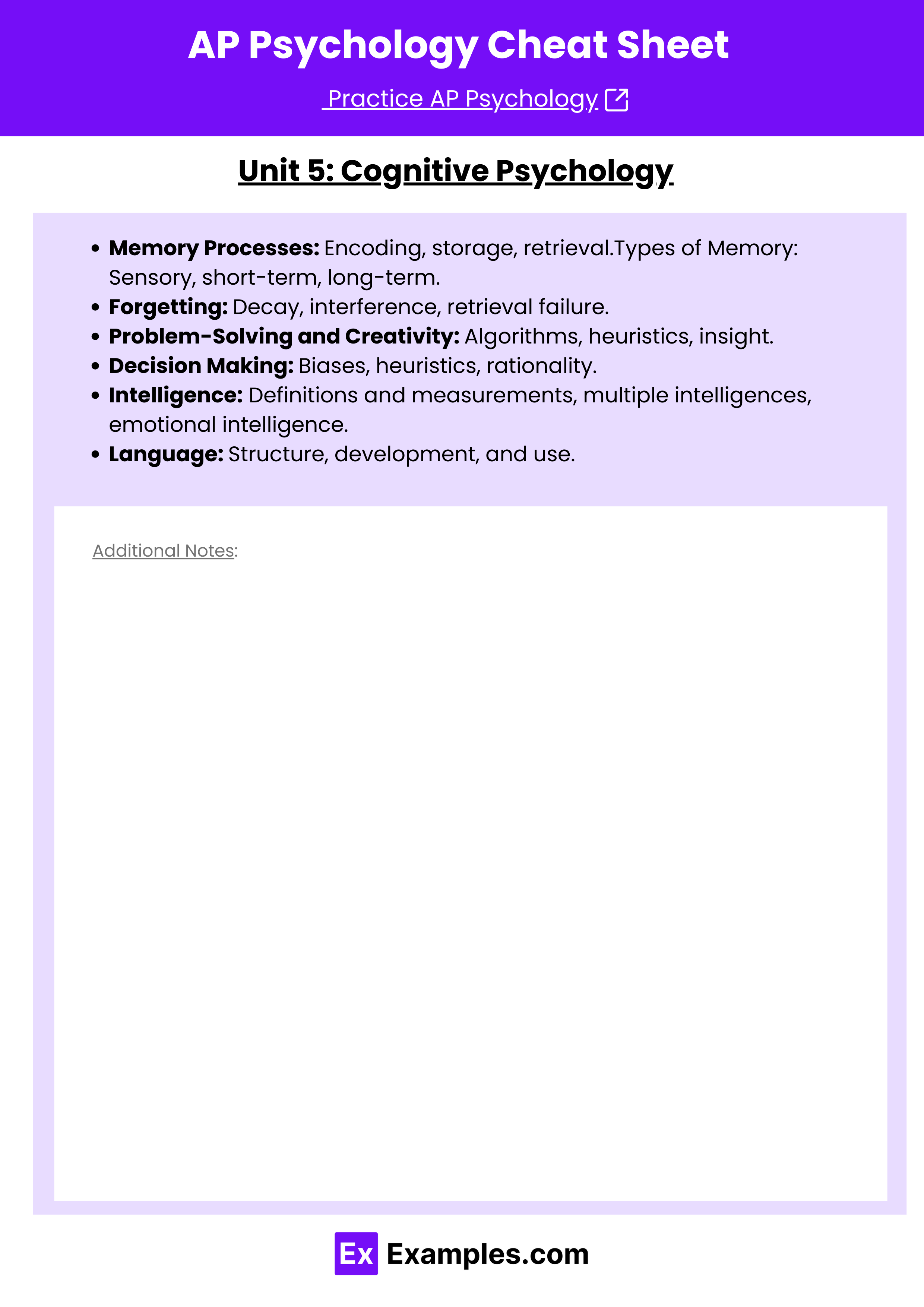
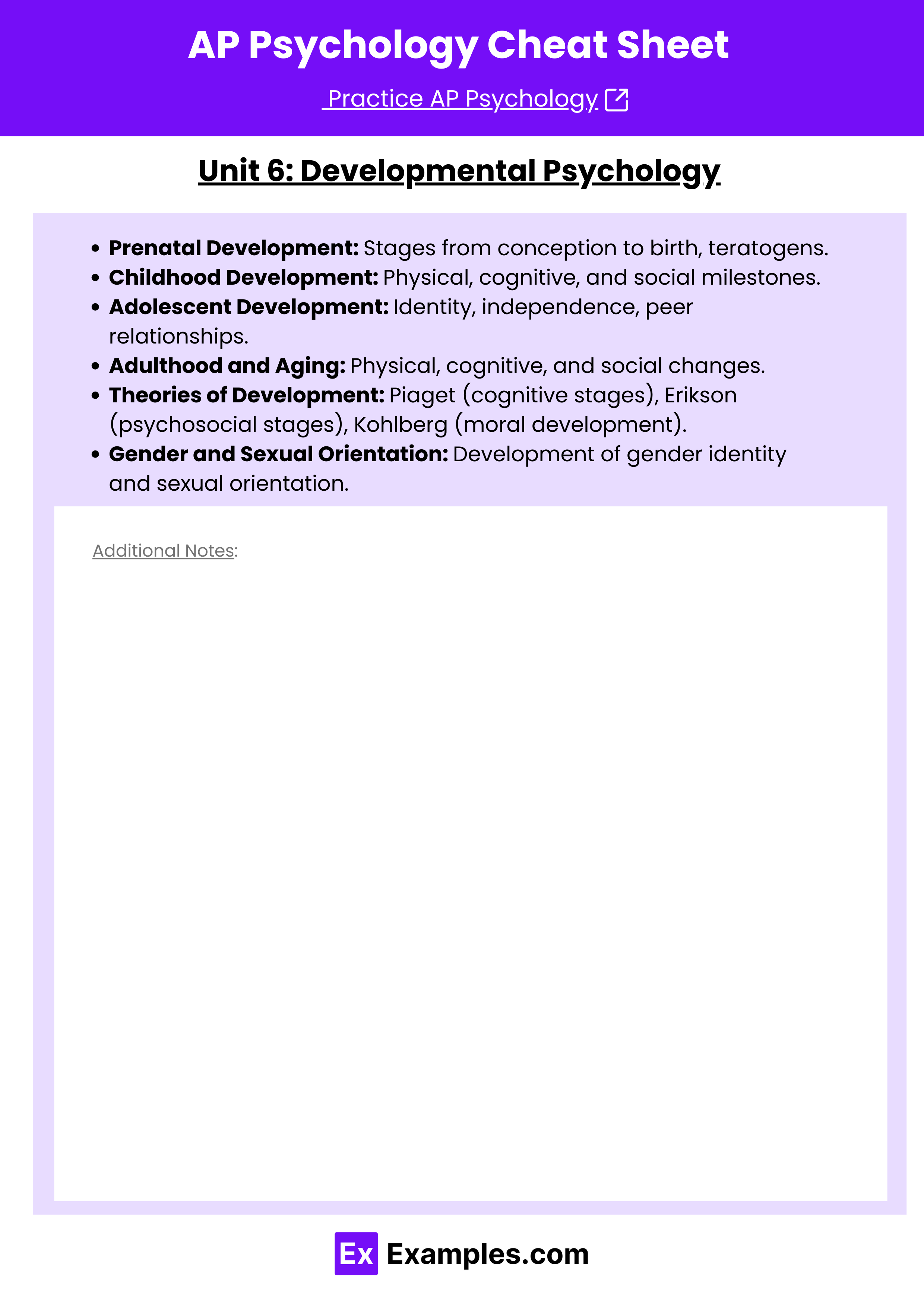
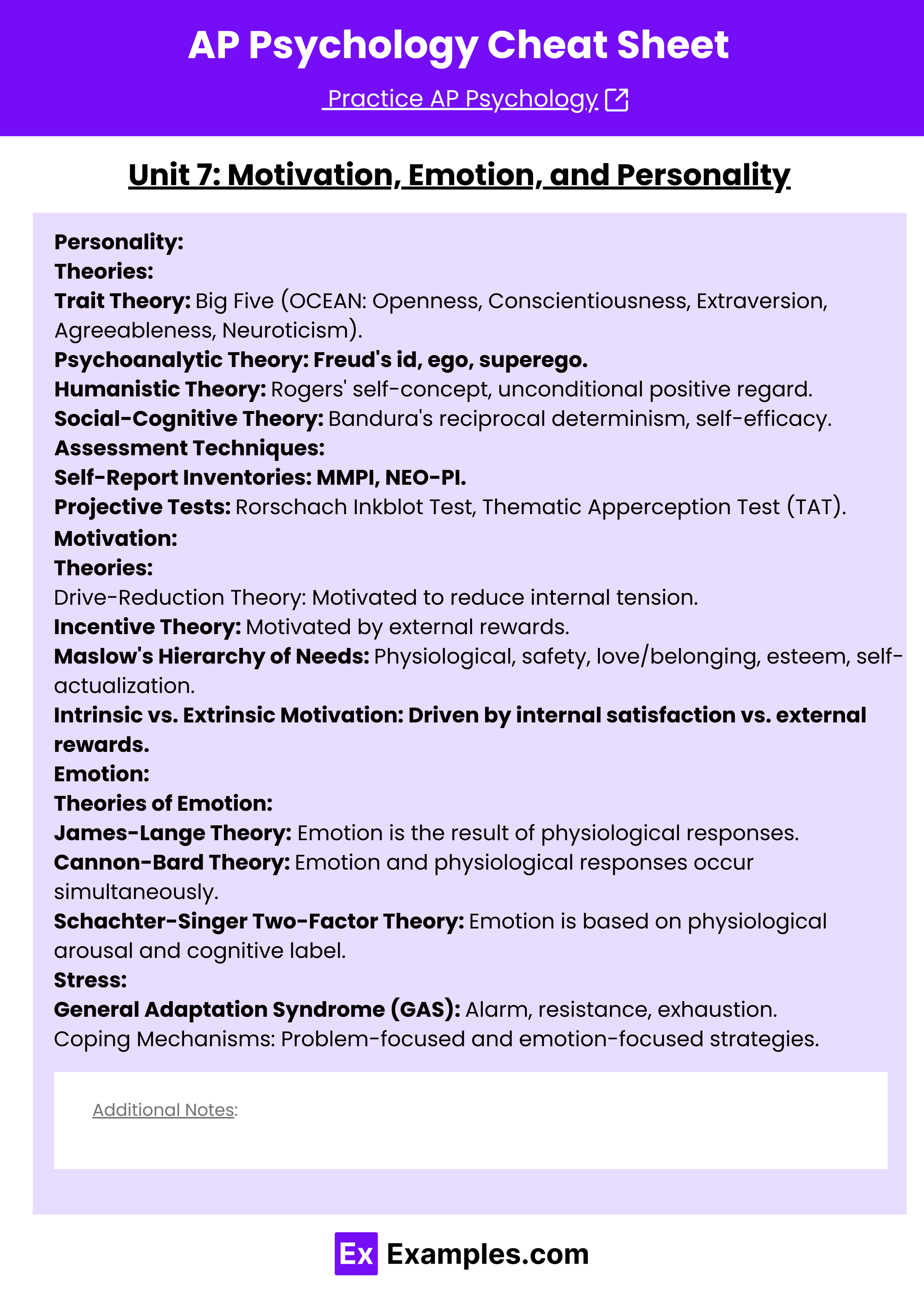
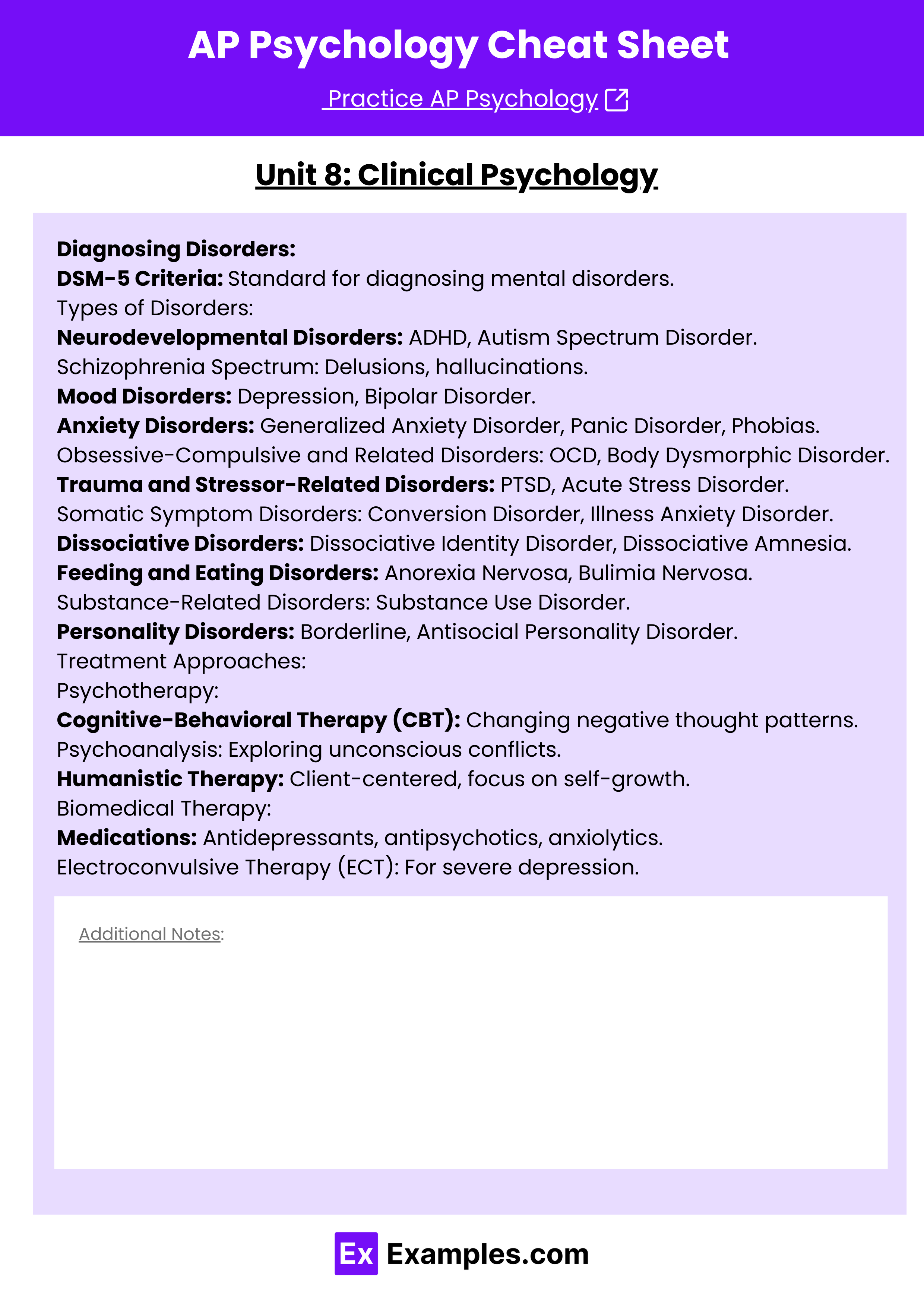
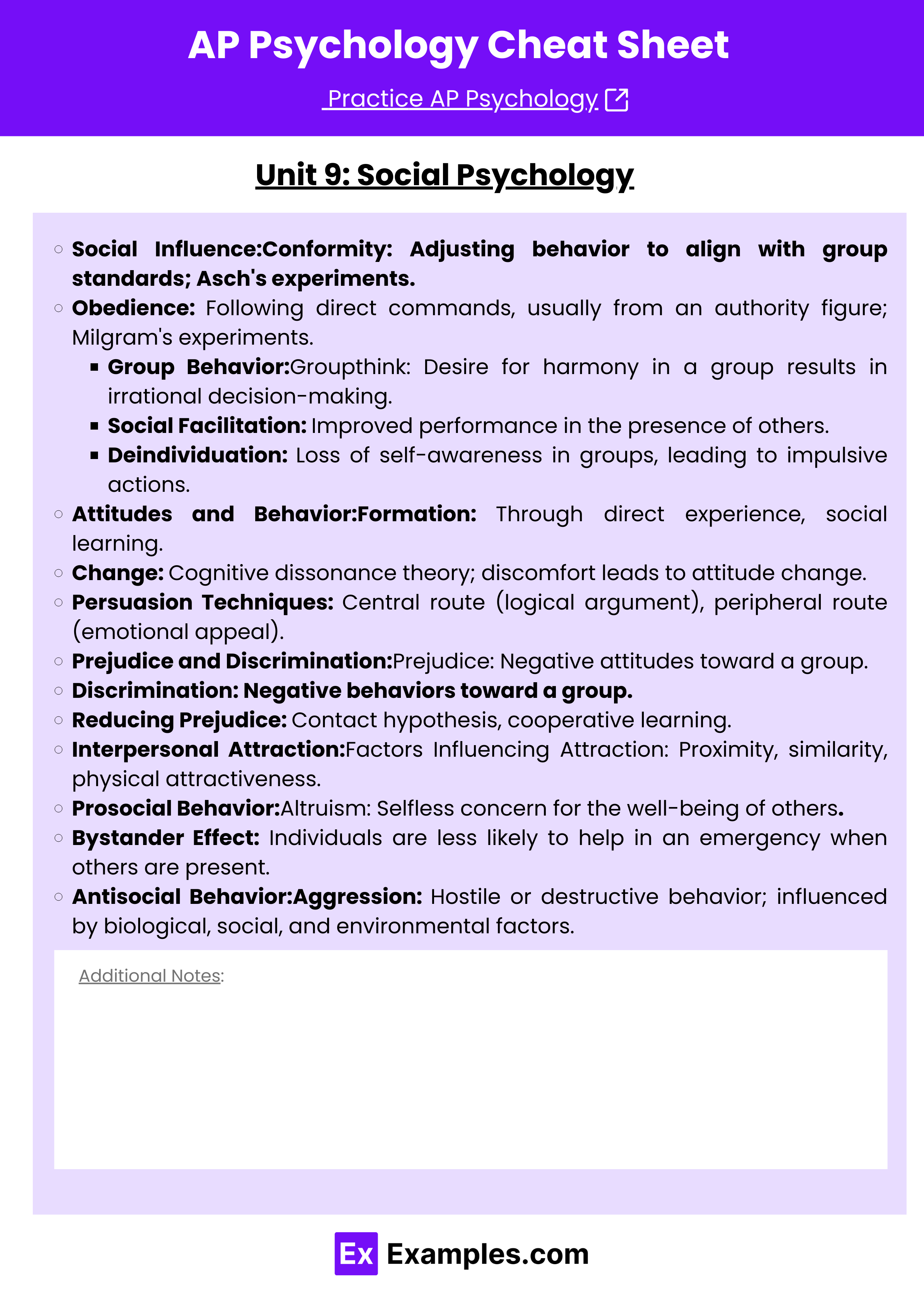
Download Psychology Cheat Sheet – Pdf
Unit 1: Scientific Foundations of Psychology
- Major Historical Figures: Wundt, Freud, Skinner, Watson
- Theoretical Approaches:
- Behavioral: Focuses on observable behavior.
- Cognitive: Studies mental processes.
- Humanistic: Emphasizes human growth potential.
- Psychoanalytic: Explores unconscious motives.
- Biopsychosocial: Integrates biological, psychological, and social factors.
- Branches of Psychology: Clinical, Developmental, Industrial-Organizational, Social
- Research Methods:
- Experiments: Determine cause and effect.
- Surveys: Collect data from a large group.
- Case Studies: In-depth analysis of individuals.
- Naturalistic Observation: Observing behavior in its natural context.
- Correlation Studies: Identify relationships between variables.
- Ethical Guidelines: Informed Consent, Confidentiality, Debriefing, Protection from Harm
Unit 2: Biological Bases of Behavior
- Nature vs. Nurture: Interaction of genetics and environment.
- Nervous System: Central (brain and spinal cord) and Peripheral (somatic and autonomic systems).
- Endocrine System: Hormones and their impact on behavior.
- Neural Transmission: Action potential, synapses, neurotransmitters.
- Brain Structures and Functions:
- Limbic System: Emotions and drives.
- Cortex Areas: Sensory processing and motor functions.
- Brain Imaging Techniques: MRI, fMRI, PET, EEG
- States of Consciousness: Sleep stages, REM, circadian rhythms.
- Substance Use: Addiction, effects of psychoactive drugs.
Unit 3: Sensation and Perception
- Sensation: Process by which sensory receptors receive stimuli.
- Perception: Organizing and interpreting sensory information.
- Thresholds: Absolute and difference thresholds.
- Sensory Adaptation: Decreased sensitivity to constant stimulation.
- Vision: Rods, cones, visual processing in the brain.
- Hearing: Sound waves, cochlea, auditory processing.
- Other Senses: Taste (gustation), Smell (olfaction), Touch (somatosensation), Vestibular sense (balance).
Unit 4: Learning
- Classical Conditioning: Associative learning; Pavlov’s dogs.
- Key Terms: UCS, UCR, CS, CR, Generalization, Discrimination, Extinction
- Operant Conditioning: Behavior modification through reinforcement and punishment; Skinner’s box.
- Reinforcement Schedules: Fixed ratio, variable ratio, fixed interval, variable interval.
- Observational Learning: Learning by watching others; Bandura’s Bobo doll experiment.
- Social and Cognitive Factors: Influence of models and mental states on learning.
Unit 5: Cognitive Psychology
- Memory Processes: Encoding, storage, retrieval.
- Types of Memory: Sensory, short-term, long-term.
- Forgetting: Decay, interference, retrieval failure.
- Problem-Solving and Creativity: Algorithms, heuristics, insight.
- Decision Making: Biases, heuristics, rationality.
- Intelligence: Definitions and measurements, multiple intelligences, emotional intelligence.
- Language: Structure, development, and use.
Unit 6: Developmental Psychology
- Prenatal Development: Stages from conception to birth, teratogens.
- Childhood Development: Physical, cognitive, and social milestones.
- Adolescent Development: Identity, independence, peer relationships.
- Adulthood and Aging: Physical, cognitive, and social changes.
- Theories of Development: Piaget (cognitive stages), Erikson (psychosocial stages), Kohlberg (moral development).
- Gender and Sexual Orientation: Development of gender identity and sexual orientation.
Unit 7: Motivation, Emotion, and Personality
- Motivation:
- Theories:
- Drive-Reduction Theory: Motivated to reduce internal tension.
- Incentive Theory: Motivated by external rewards.
- Maslow’s Hierarchy of Needs: Physiological, safety, love/belonging, esteem, self-actualization.
- Intrinsic vs. Extrinsic Motivation: Driven by internal satisfaction vs. external rewards.
- Theories:
- Emotion:
- Theories of Emotion:
- James-Lange Theory: Emotion is the result of physiological responses.
- Cannon-Bard Theory: Emotion and physiological responses occur simultaneously.
- Schachter-Singer Two-Factor Theory: Emotion is based on physiological arousal and cognitive label.
- Stress:
- General Adaptation Syndrome (GAS): Alarm, resistance, exhaustion.
- Coping Mechanisms: Problem-focused and emotion-focused strategies.
- Theories of Emotion:
- Personality:
- Theories:
- Trait Theory: Big Five (OCEAN: Openness, Conscientiousness, Extraversion, Agreeableness, Neuroticism).
- Psychoanalytic Theory: Freud’s id, ego, superego.
- Humanistic Theory: Rogers’ self-concept, unconditional positive regard.
- Social-Cognitive Theory: Bandura’s reciprocal determinism, self-efficacy.
- Assessment Techniques:
- Self-Report Inventories: MMPI, NEO-PI.
- Projective Tests: Rorschach Inkblot Test, Thematic Apperception Test (TAT).
- Theories:
Unit 8: Clinical Psychology
- Diagnosing Disorders:
- DSM-5 Criteria: Standard for diagnosing mental disorders.
- Types of Disorders:
- Neurodevelopmental Disorders: ADHD, Autism Spectrum Disorder.
- Schizophrenia Spectrum: Delusions, hallucinations.
- Mood Disorders: Depression, Bipolar Disorder.
- Anxiety Disorders: Generalized Anxiety Disorder, Panic Disorder, Phobias.
- Obsessive-Compulsive and Related Disorders: OCD, Body Dysmorphic Disorder.
- Trauma and Stressor-Related Disorders: PTSD, Acute Stress Disorder.
- Somatic Symptom Disorders: Conversion Disorder, Illness Anxiety Disorder.
- Dissociative Disorders: Dissociative Identity Disorder, Dissociative Amnesia.
- Feeding and Eating Disorders: Anorexia Nervosa, Bulimia Nervosa.
- Substance-Related Disorders: Substance Use Disorder.
- Personality Disorders: Borderline, Antisocial Personality Disorder.
- Treatment Approaches:
- Psychotherapy:
- Cognitive-Behavioral Therapy (CBT): Changing negative thought patterns.
- Psychoanalysis: Exploring unconscious conflicts.
- Humanistic Therapy: Client-centered, focus on self-growth.
- Biomedical Therapy:
- Medications: Antidepressants, antipsychotics, anxiolytics.
- Electroconvulsive Therapy (ECT): For severe depression.
- Psychotherapy:
Unit 9: Social Psychology
- Social Influence:
- Conformity: Adjusting behavior to align with group standards; Asch’s experiments.
- Obedience: Following direct commands, usually from an authority figure; Milgram’s experiments.
- Group Behavior:
- Groupthink: Desire for harmony in a group results in irrational decision-making.
- Social Facilitation: Improved performance in the presence of others.
- Deindividuation: Loss of self-awareness in groups, leading to impulsive actions.
- Attitudes and Behavior:
- Formation: Through direct experience, social learning.
- Change: Cognitive dissonance theory; discomfort leads to attitude change.
- Persuasion Techniques: Central route (logical argument), peripheral route (emotional appeal).
- Prejudice and Discrimination:
- Prejudice: Negative attitudes toward a group.
- Discrimination: Negative behaviors toward a group.
- Reducing Prejudice: Contact hypothesis, cooperative learning.
- Interpersonal Attraction:
- Factors Influencing Attraction: Proximity, similarity, physical attractiveness.
- Prosocial Behavior:
- Altruism: Selfless concern for the well-being of others.
- Bystander Effect: Individuals are less likely to help in an emergency when others are present.
- Antisocial Behavior:
- Aggression: Hostile or destructive behavior; influenced by biological, social, and environmental factors.
This cheat sheet is designed to provide a quick reference to essential concepts and key terms for the AP Psychology exam, helping you to study efficiently and effectively.

